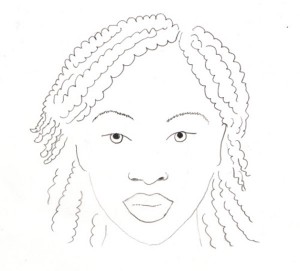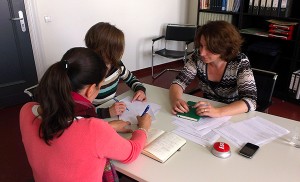Inés Garland’s Novel for Young Adults about Friendship and Love
During the week of October 21 to 27, 2013 the Academy of the Jewish Museum Berlin, in cooperation with Kulturkind e.V., will host readings, workshops, and an open day for the public with the theme “Multifaceted: a book week on diversity in children’s and young adult literature.” Employees of various departments have been vigorously reading, discussing, and preparing a selection of books for the occasion. Some of these books will be introduced here over the course of the next few months.

Why are young adult novels touching in a different way than books for adults? And why are they touching not only for young people?
Is it that the writers of stories for young adults are less embarrassed to use everything they have to elicit strong feelings in their readers?
Barring Harry Potter, I hadn’t read any young adult books since my own adolescence, until reacquiring a taste for them over the course of our reading marathon. A taste for giving myself over completely to the beautiful, tragic, comic destinies of the characters, for succumbing to a story. For example, to the story of Alma in Inés Garland’s book Piedra, papel o tijera [‘Rock, Paper or Scissors’] (in the original Spanish, or Wie ein unsichtbares Band [‘Like an Invisible Ribbon’] in the German edition): (more…)
Names have meanings. They project the hopes, dreams, and aspirations of fathers and mothers, they follow trends, and foretell the future of their bearers. For Jews many decisions are connected to the naming of a child: should the name reveal his or her religious affiliation, only be recognizable to other Jews, or neither? Will it be a name native to the family’s country of origin or to the child’s country of birth? Has the name been translated? Does it memorialize someone? Colleagues and friends of the Jewish Museum Berlin share their thoughts with this blog, on this and other questions.
Naomi
 My name means “pleasant” in Hebrew, and pleasantly inconspicuous it was in North America of the mid-1970s, where I was born. Naomi ranked neither among the fashionable names like Jennifer, Amy, Melissa and Heather, nor was it as unusual as the names given to the other flower-children of my generation, such as Blossom, Charisma, Summer, or Echo.
My name means “pleasant” in Hebrew, and pleasantly inconspicuous it was in North America of the mid-1970s, where I was born. Naomi ranked neither among the fashionable names like Jennifer, Amy, Melissa and Heather, nor was it as unusual as the names given to the other flower-children of my generation, such as Blossom, Charisma, Summer, or Echo.
Referring to the Biblical story of Ruth and Naomi, the name is popular among Jews. (more…)
The Blog’s Editorial Staff in Discussion (Part II)

Meeting of the website editors
© Jewish Museum Berlin, photo: Michael Butschkau
Naomi Lubrich: We recently talked together about Eva Menasse’s novel Quasicrystals but we haven’t decided which of us will write a review of the book for our blog. Personally I would be interested in doing it, and I have something to say not only about the Jewish theme but also about Menasse’s image of women, that I found to be unrealistically and ideationally drawn. Xane is a downright caricature of a “high-powered woman”: a caring mother and stepmother of three children with, to some extent, behavioral problems. And at the same time she’s a leading film artist and influential intellectual. On top of all this she has a harmonious, uncomplicated marriage, and she even gets involved with a number of other men… (more…)


